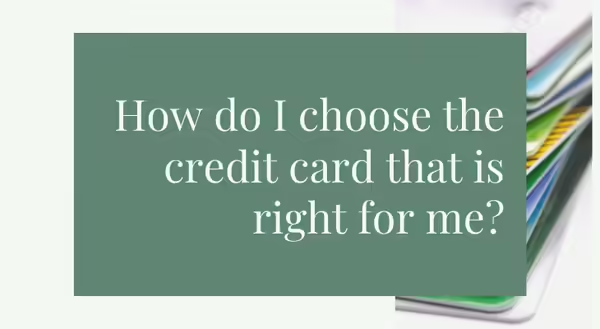
Credit cards are a helpful tool that can build your credit history, allow you to make purchases that can be paid off over time, and save you from fidgeting around with cash at the register. When applying for a credit card however, it is important to keep in mind that some cards may better suit your needs than others. Here are a few factors to consider and compare before choosing a card:
- APR—The Annual Percentage Rate is the annualized interest rate, otherwise known as the cost of borrowing money. This rate can either be fixed or variable (fluctuating over time). You do not have to pay the interest if you’re paying off your credit balance in full every month. And although not covered in this article, you should be aware that your credit score can impact the APR that credit card companies are willing to offer you. Having a lower credit score will make you seem riskier in the eyes of a lender, and they will up the interest rates charged to you to compensate.
- Credit Limit—The credit limit is the amount of money that your card issuer (e.g. credit card company) is willing to let you borrow. For most college students, a low-limit card may be a good option as it can prevent you from taking on more debt than you can pay off. Once you graduate however, having a higher limit will allow you to take on larger expenses, while also making it easier to spend a lower percentage of your credit limit each month since you have more of a ceiling to work with (consistently utilizing a lower percentage of your credit limit can also improve your credit score).
- Fees/Penalties—Credit cards can come with all sorts of deal breaking fees. A common one to look for is an annual fee. Cards that charge an annual fee may come with better rewards or a lower APR in return, so it is up to you to determine whether it is worth paying or not. There can be fees for balance transfers, cash advances, going over your credit limit, paying your bills late, and more. It is important to understand the terms and conditions of your credit card so you can avoid needlessly paying fees. You can often find the terms of a credit card either on the issuer’s website, the credit card application, or the credit card agreement. The agreement outlines the terms, conditions, fees, and penalties associated with your card. If you already have a credit card, you can request a copy of the agreement from your credit card company.
- Rewards—Rewards programs can be a huge incentive to choose one card over another. Your purchases can earn you points, which can then be applied towards travel expenses, retail purchases, and more. Find out how to maximize your rewards, and choose cards with rewards programs that complement your spending habits.
Depending on how you intend to use it, the credit card that is right for you may differ from the one that is right for someone else.
- If you plan to pay off your balance every month, then having no annual fee may be more important to you than a low APR.
- If you plan to use your card regularly, then having a larger credit limit or comprehensive rewards program might be more important.
Regardless, doing your research is the most surefire way to ensure that you find the card that best suits your needs.
Written by Joseph Tan, Financial Wellness for College Students Peer Educator, University of Illinois Extension, Spring 2018. Reviewed by Kathy Sweedler, University of Illinois Extension.
For more financial education content, follow us on Instagram, Facebook, or Twitter.